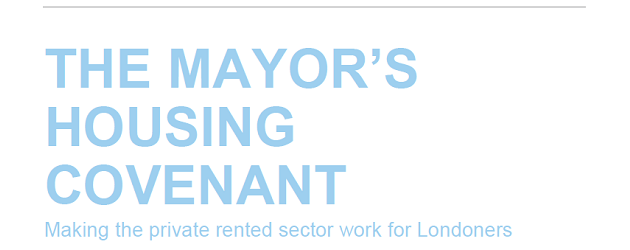The Mayor of London, Boris Johnson, has set out a number of key proposals to empower tenants and landlords in London’s burgeoning private rented sector.
 |
| [relatedPosts title=”Related Posts”] |
|
|
With almost one in four Londoners living in private rented accommodation and the proportion of households projected to increase to 37% by 2025, the Mayor recognises that the private rented sector is increasingly important for many working Londoners who contribute to the city’s economic success.
Publishing the first ever detailed blueprint on the sector by City Hall, the Mayor has called for the establishment of a new deal with landlords, letting agents and tenants based around a voluntary and transparent ‘London Rental Standard’ (LRS), which will be consulted on with the industry and launched next year by the GLA.
The LRS details 12 core commitments, including minimum expectations around protection of deposits, provision of contact details, emergency and urgent repairs response times, property conditions, complaints handling, fee transparency, as well as landlord and letting agent training and development through professional training courses.
The Mayor believes the majority of landlords offer professional services to their tenants, with around 68% of Londoners reporting that they are either satisfied or very satisfied with their landlord. However, with a large number of landlord and letting agent accrediting organisations, the Mayor wants to establish a set of ambitious universal standards that renters should expect from any accreditation scheme operating in the capital, matched with incentives for landlords to join.
To help meet increasing demand for private rented accommodation the Mayor will be targeting funding from the Government’s forthcoming £200m equity fund for the construction of more homes, rather than introducing burdensome regulation or rent controls. He also wants to explore ways in which the design of new homes can better reflect the needs of renters – such as better use of communal space and bathrooms for every tenant – as well as launching a design competition to seek out the best ideas for new developments.
The Mayor of London, Boris Johnson, said: “The private rented sector is a vital and growing component of our city’s dynamic economy. The vast majority of the capital’s landlords provide a highly professional service, but with a vast array of accreditation schemes there is a strong case for landlords and letting agents to get round the table to agree a set of ambitious standards that will empower them and their tenants.
“Boosting supply, not burdensome regulation like rent controls, is the key to ensuring that the sector remains a significant feature of London’s housing market. I will also be looking closely at how we can cater better for the needs of private renters through new developments across the capital that show commitment to truly innovative design.”
Richard Lambert, Chief Executive of the National Landlords Association said: “The National Landlords Association has worked extensively with the Mayor’s office and welcomes the proposals outlined in the London Rental Standard. The NLA believes that building on existing landlord accreditation schemes is the most effective way of establishing minimum management standards in the Capital’s private-rented sector.
“Accreditation gives tenants peace of mind in a housing market which can seem daunting to those looking for a place to live by providing the assurance that that their landlord and agent knows what they are doing. Crucially, this is backed up by a specific and robust complaints process in the unlikely event of a dispute. We will continue to work with the Mayor and other industry bodies to ensure that Londoners can expect a certain professional standard from their landlord or agent”.
Ian Fletcher, Director of Policy at the British Property Federation said: “This paper goes to the heart of the challenges of renting in London – how we provide more homes and promote a better quality private rented sector. Through detailed analysis the GLA has really sought to understand the private rented sector in London. We welcome the end result, which shows the Mayor is prepared to do all he can to promote investment and raise standards. Ultimately bringing various schemes together under one Rental Standard will make it more easily recognisable to consumers and therefore of greater value to those signing up. It has our full support.”
With research showing that longer-term tenancies can improve people’s economic prospects and be in landlords’ longer-term interests, and significant growth in the number of families in the private rented sector, the Mayor will also be inviting major landlords to participate in a pilot to test out how they can offer tenants longer contracts and greater certainty over rent increases.
The GLA has been working with accrediting organisations for over a year to agree a set of universal standards including: London Landlord Accreditation Scheme (LLAS), National Landlords Association (NLA), National Approved Lettings Scheme (NALS), Association of Residential Lettings Agents (ARLA), Residential Landlords Association (RLA), British Property Federation (BPF) and Accreditation Network UK (ANUK).
Further Information
- The Mayor’s Housing Covenant is available here (PDF).





